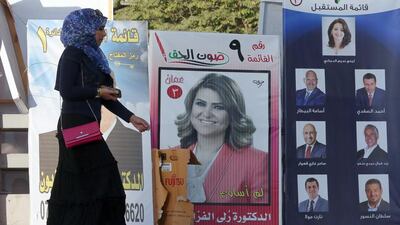Significant changes were introduced to the Jordanian electoral law this year, with a list-based system replacing the previous one-person-one-vote rules.
Writing in the pan-Arab daily paper Al Hayat, Jordanian columnist Ibrahim Al Gharaibeh did not see any clear and direct indication of the political and social inclinations of Jordanians in recent voting behaviour.
“The general elections are in fact separated from the political organisation of the country and its communities,” he noted.
“The electoral programmes, campaigns and debates do not mention terrorism and other relevant issues such as extremism, fanaticism, social division and the religious debate that is inextricably linked to identity, education, media, social conflicts and lifestyle not to mention development and public expenditure.”
The writer saw no link between the electoral campaigns, candidatures and the candidates’ performance and communication with their voters on the one hand and the challenges posed by terrorism, extremism and their social, political and regional consequences on the other hand.
“This means that terrorism is not a matter of concern for the voters nor is it of any use to the candidates in acquiring votes. This also means that all the amounts spent on the elections, that all that has been said in the media and in conferences, seminars, fatwas, strategies, programmes and institutions on terrorism and that all the chants, slogans, celebrations, publications, studies and articles have failed to mobilise Jordanians to combat terrorism and to intellectually and politically involve them in this issue.
“Even terrorist operations, from the immolation of the pilot Moaz Al Kasasbeh to the attacks that killed several nationals and that continue to threaten the daily lives of Jordanians, have failed to foment thoughts and orientations that they would seek to express and implement through the parliamentary and general elections,” he concluded.
Writing in the Arabic-language daily Al Arab, Mohammed Qawwas noted the Muslim Brotherhood’s participation in the current elections through its political wing, the Islamic Action Front, even though some considered it illegal given the legal measures taken by the Jordanian authorities against the Brotherhood.
The writer saw two sides to the story. “The Muslim Brotherhood is taking part in the elections in a bid to compensate for what close sources describe as the sin of boycotting the previous elections in 2010 and 2013.
“The Jordanian authorities are allowing the Muslim Brotherhood to engage in the electoral process after a legal political conflict that resulted in boycotting the Brotherhood and in shutting down its headquarters.”
This, he opined, reflects a common desire to try to coexist as per the rules imposed by the government.
Qawwas noted that the new electoral law activates a list-based system according to political programmes that transcend regionalism and tribalism, but that “the old law has ruined the collective party experience and so the political community has minimal experience in collective work and coalition-building.”
The Muslim Brotherhood was the only party to present 19 lists and 111 candidates in a bid to win a decent number of seats in the new parliament, while the other parties could not put forward lists at country-level. According to the writer, the elections show the tendency of Jordan’s political system to see the opposition floating on the surface of the general political scene rather than walking around in the back lanes.
“Jordan now prefers to manage the political process with all the Islamists, leftists, nationalists and youth within the parliamentary and legal political system as needed by the country to fight for its unity and integrity and to survive in a time where big projects reign in the region,” he commented.
Although the old electoral law is dead and buried, the writer saw little hope in changing the political scene with the new electoral law and the current elections where the campaigns are reminiscent of the previous one-person-one-vote system thanks to the individuality of their candidates.
* Jennifer Attieh
translation@thenational.ae

